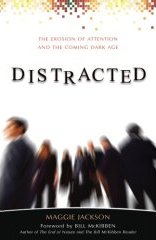Distracted, Maggie Jackson
Distracted is the story of the function of attention. In nine chapters organized into three parts, Maggie Jackson takes us on a tour of the past, present, and possible future of our ability to pay attention. She begins with Part I (“Lengthening Shadows”), considering the landscape of our consciousness today. Jackson winds the calendar back to 1880 to examine a society that has become interrupt-driven. Her look at technology brings us through life in a virtual world, high-bandwidth information delivery, and how we have optimized our lives to work “on the go,” rather than where we are.
In Part II (“Deepening Twilight”) Jackson looks at surveillance, the use of technology to observe, and its impact on the observed. Moving on to how we process information, she writes about the history of speech and the history of writing. She then focuses on reading—not an act of nature, but one that we must undertake deliberately if we’re to do at all. We’re then taken into the world of “smart machines,” computers and robots that display empathy and that give us the kind of personal attention that we seem incapable of getting from other humans.
Undoubtedly, distracted readers will fail to realize that the journey has taken them through two iterations of three critical components of thinking: focus, judgment, and awareness.
Part III (“Dark Times...Or a Renaissance of Attention?”) introduces a lovely term, McThinking, and considers what happens to our ability to succeed, to plan, and even to reason when instead of assimilating information, we passively watch it fly before our eyes. We cannot synthesize one set of information that we don’t know with another set of information that we don’t know. Lacking engagement, we’re unable to detect, much less to resolve, conflicts. Jackson concludes her discussion with “The Gift of Attention,” looking at how science is showing that attention is not a fixed value doled out to each of us In The Beginning, but something that we can, through effort, develop.
Maggie Jackson’s tour through attention and its absence is both timely and welcome. She engages in the valuable service of holding a mirror before us, showing us truly what we as a society have become. As was noted by Dr. Walter Gibbs in the 1982 movie Tron, intelligent machines and easy access to information can have surprising side-effects. “Won’t that be grand?” he asked a brilliant young programmer. “The computers and the programs will start thinking and the people will stop!”
As anyone who has asked a simple question only to have the listener type the question into Google knows, there are many technology-dependent citizens among us, completely unable to do anything but regurgitate what the computer said. Far too many among us have become as useless as a crew member on the bridge of a spaceship in a science-fiction television series: unable to do anything but to ask the computer questions and to regurgitate the answers. (In fact, it’s worse; the sedentary Google-surfers have none of the aesthetic value of the curvy crew member with the form-fit uniform.)
Kurt Vonnegut made a similar point in his 1961 short story, “Harrison Bergeron.” The objective of that society was equality; everyone was equal in every way. Of course, this was merely a way of saying that the society was only as good as the worst of its members in every way. Those capable of greater thought were made equal to everyone else by having regular interruptions of their attention.
I am grateful to Maggie Jackson for her consideration of the topic of attention and suggest that anyone who cares about the future of our society give Distracted some much-deserved time and focus.


